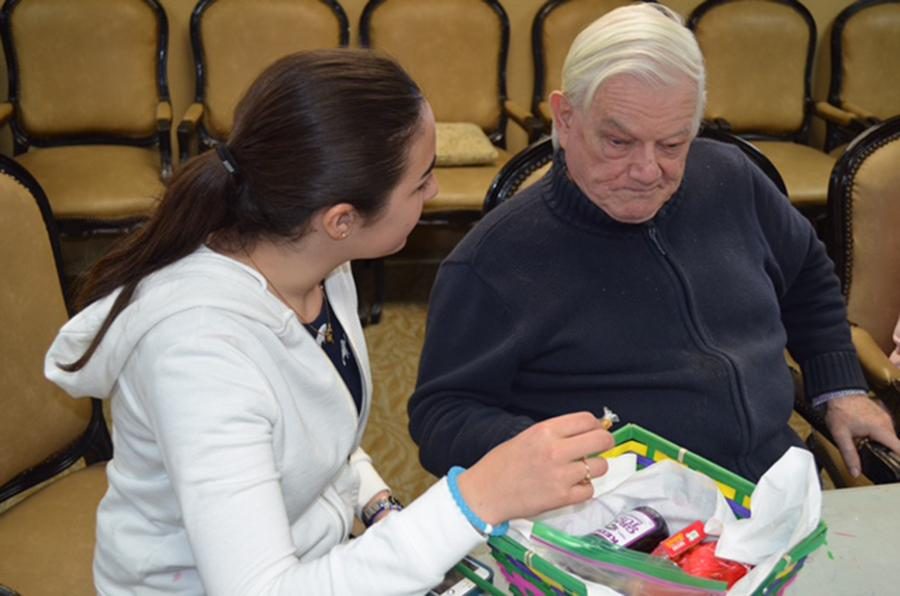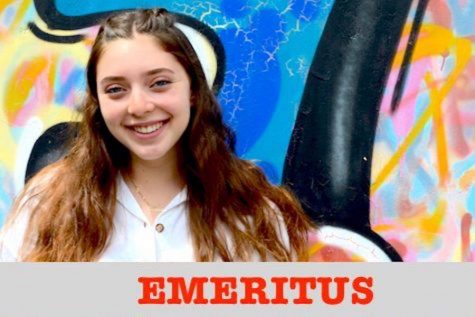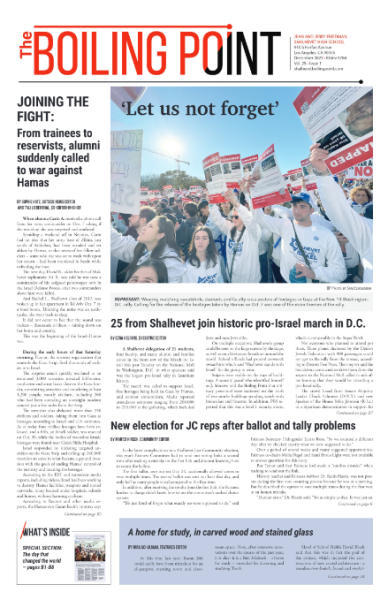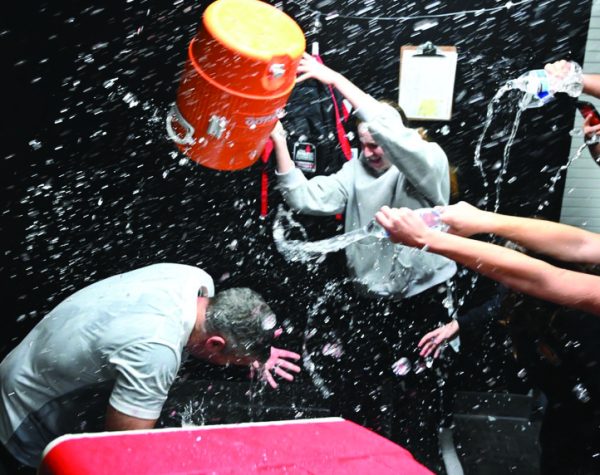With activities and talking, club gives local seniors what they say they need
CHESED: Freshman Tara Chriki gave mishloach manot to a senior citizen at the Beverly Hills Carmel in March. She is among 10 female students who visit weekly to enhance the days of some of the residents.
June 9, 2016
Dr. Franklin Prieser sat in a beige chair, his leather shoes resting on a beige carpeted floor as he belted out “America the Beautiful,” overpowering the other voices in the room through a hand-held microphone as the instrumental played on a karaoke machine in the corner.
Then he looked up from the Sing-Along with ElderSong lyric book, his previously serious face overridden by a grin.
“I love to sing,” Dr. Prieser told a visitor to his residence at the Beverly Hills Carmel North Assisted Living home May 17. “I worked in a lot of places for a long time, and then all of the sudden I was retired, and now I go around finding things for myself to do.”
Every week this year, a Shalhevet club called Better Together has provided what some like Dr. Prieser are missing: something to do. Every Tuesday from 4 to 5 p.m., approximately 10 female students have visited the Beverly Hills Carmel North and South, sister homes on opposite sides of Burton Way in Beverly Hills.
“It’s a bright light in a very dull week,” said Arnold Hoffman, 96, who resides at the South home and participates in Better Together.
With a two-year grant funded by the Legacy Heritage Foundation, the Better Together program has now grown from a family affair to what students hope will be a permanent part of Shalhevet’s chesed program. It started when junior Alec Fields and his siblings regularly visited a great-aunt and uncle there and delivered cookies, divrei Torah and news updates to their friends, then expanded to a school activity at Maimonides and later, Shalhevet.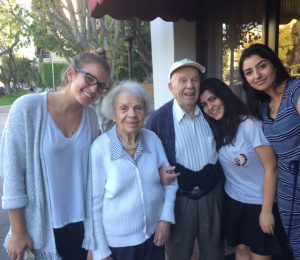
Last year, Judaic Studies teacher and Chesed coordinator Mrs. Ruthie Skaist took charge of it and became program liaison for the grant. This year it was taken over by junior Lindsay Schacht.
More than a few of the residents are Holocaust survivors, which is an additional draw for the students.
“It’s so important to be in touch with the survivors, we are lucky enough now to be in personal contact with them,” Lindsay said. “We need to take advantage of that.”
In the homes; residents appreciate the Jewish connection as well.
“I have a confidence now after meeting you girls for about a month or so that Judaism will survive,” said Mr. Hoffman. “You have preserved my faith in Judaism.”
Students are assigned to either the South or North Carmel home, and the residents and their buddies participate in different activities and group discussions, relating to Judaism. Students bring costumes and plan other fun activities relating to Jewish holidays to hopefully bring joy into the residents’ lives.
“It’s really in our advantage that they’re Jewish homes so we all have that in common,” Lindsay said. “There’s this one guy there and after every single meeting he says, ‘You guys bring the light into the house.’”
Bridgette Woolinsky, activities director at the North Carmel home, used similar words to describe Better Together.
“When the students come in, we see the residents light up,” said Ms. Woolinsky. “And for our residents with memory issues, it helps them to feel present, and helps them feel like they’re not forgotten.”
Junior Sarah Yadegari, who visits the South Carmel home, said the feeling was mutual.
“They’re always saying how delighted they are to see us and how happy our visits make them,” Sarah said. “It’s so much fun brightening their days, and they really end up brightening our weeks.”
The homes are about two miles from school, and every week at 3:40 PM during SWAP, Lindsay and junior Dana Alkoby drive four to five girls to the meetings. Coordination can be tricky, Lindsay said, as can finding discussion topics that everyone can engage in. Subjects that have been used in past visits have been the importance of memory, belief in miracles, and Zionism.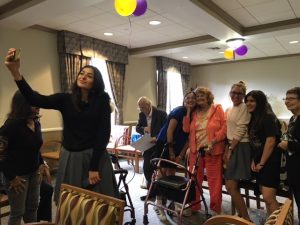
“I have to make sure I’m planning something that’s interesting to the students and the residents at the retirement home so that everyone enjoys it,” Lindsay said. “But they tell us all the time that they don’t really care what we do, they just like when we’re there and they just like being with us.”
Although run by the same company, the two homes attract slightly different residents. According to Ms. Woolinsky, the South home is more deeply rooted in Judaism, with most of its residents being European.
“Across the street has a more European flavor, [while] this has a more lodge-y, American feel,” Ms. Woolinsky said.
Another difference is that the residents at the North home are significantly more forgetful than the residents at the South home, often forgetting the student visitors from one visit to the next.
“They’ll often repeat themselves and not realize it,” said Sarah, “and even though sometimes it’s difficult to nod your head and be understanding, we have to always make sure that they feel heard and that their story is very important.”
But residents said Better Together actually helps them with their memory.
“Having you visit stimulates certain memories that I don’t think I remembered before,” said 86, who lives at the South home.
Ms. Woolinsky described the value of learning from the elderly.
“They’re just people,” Ms. Woolinsky said. “A lot of times people assume that because they’re older they don’t have anything to give, but they have so much — they have stories, they have the wealth of knowledge.”
Although the grant is running out and Mrs. Skaist is leaving after this June, everyone expects the program to continue. Lindsay will continue to run the program, and the new faculty liaison will be Mrs.Sarah Leah Gormin, the new Chesed coordinator and wife of Talmud teacher Rabbi Derek Gormin.
That was good news for Gilda, a resident of Carmel South.
“There are so many things to talk about,” said Gilda. “It’s just the beginning. We talk about our upbringings and our backgrounds. We learn from them and they learn from us.”

